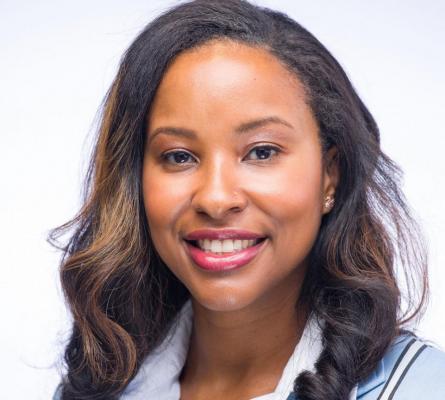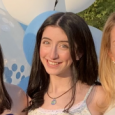As part of NGCP's 20th Anniversary celebrations, our Youth Advisory Board will be interviewing influential equity and STEM leaders and partners throughout 2022.
Before I begin detailing the beginnings, successes, challenges, and monumental accomplishments of Dr. Siobahn Day Grady, I want to touch on her personal qualities that I can personally attest to. I was introduced to Dr. Grady through an NGCP Youth Advisory Board meeting, and I have in my meeting notes, "She's literally so cool!" I then reached out to her, asking if I could interview her for a small podcast. My co-host and I realized she would be in DC in a few weeks for the unveiling of 120 life-sized, 3D-printed, bright orange statues of inspirational female scientists at the Smithsonian. We attended, and I saw her speak in person; she was articulate and engaging, even adding in a Kahoot at the end, which got everyone very excited (not to brag, but I won)! But what means so much more to me is how kind she was to my friend and me. She introduced us to her family and friends, invited us to walk around with them, and went out of her way to make us feel special, even when the spotlight shone on her. She is intelligent and confident, kindhearted and thoughtful, accomplished but humble, and truly thinks of others first. Even the fact that Dr. Grady has spoken at national and international conferences and still made time for my podcast speaks volumes.

Dr. Day's passion for computer science began in her home. Her father is a mathematician, her mother worked in IBM, and Dr. Grady was exposed to role models in her field of interest from a young age. Being an only child, she traded playing with siblings for playing video games, which sparked her love for computers! Dr. Grady was building websites as early as middle school when she was also a part of the Math and Science Education Network (MSEN). She traveled to UNC-Chapel Hill through this Saturday Academy to continue her math and science courses. This academy provided a community of other STEM lovers, which continued to spur her initial interest. "With this community of STEM lovers, it was nice to not feel like a nerd … even though I am one!" she laughs. Her parents pushed her to be her best self and share with the world. "Through being a role model or a professor, I'm just sharing my gifts with the world, and I am truly grateful I have the opportunity to do that," she adds.
In 2018, Dr. Grady became the first woman computer science Ph.D. graduate from North Carolina Agricultural and Technical State University (2018). When asked to elaborate upon her challenges in achieving such an accomplishment, she noted, "The numbers are dismal for black women in computer science. I had to dispel misconceptions about whether or not women can really code or how technical I am. In 2018 and today, people still have stereotypical assumptions about what women can do." The key for Dr. Grady was resilience and the ability to bounce back when something happens. She highlighted her robust support system, from professors supporting her, friends who were praying for her, and peers who were motivating her. "If I could complete the journey, it's possible for anyone! Focus on your potential, and don't be afraid to ask for help if you need it." Dr. Grady is truly living her purpose. She genuinely enjoys her work, such as being a role model or mentor, which are her personal missions.
Dr. Grady is an assistant professor of Information Science/Systems in the School of Library and Information Sciences at North Carolina Central University, Program Director for the Information Science program, Lab Director for the Laboratory for Artificial Intelligence and Equity Research (LAIER), and AAAS IF/THEN® Ambassador. Her research focuses on utilizing machine learning to identify sources of misinformation on social media and on improving fault detection in autonomous vehicles. She did her dissertation work on misinformation, where she used Twitter data and Machine Learning (ML) to identify authorship in hopes of identifying the source of misinformation. With autonomous vehicles or self-driving cars, she uses ML to work to address faults in real-time. When I asked her to explain how Machine Learning works to the average person, she responded with, "the more data you give it, the more it learns, and the better it can predict what the outcomes may be."
But that's not all. Dr. Grady advocates increasing the number of women and minorities in computer science. She created "STEM-It-Yourself", a program modeled off of Do It Yourself, to aid students in developing their STEM Identity. The program is for middle school girls in rural Eastern North Carolina, part of her grant provided iPad technology and guest speakers, who were women in STEM from various fields and backgrounds. Additionally, Dr. Grady has created two endowed scholarships, the Dr. Siobahn C. Day Endowed Scholarship at Winston-Salem State University and Pinnix-Brown Endowed Scholarship at North Carolina Central University.
Though I only scratched the surface of all that Dr. Grady is, I hope that you were able to get some inspiration from reading this post. I wrote about her on my AP Language Exam, and she continues to be a huge source of inspiration to me. To learn more about her or to request for her to speak, you can visit siobahncday.com

